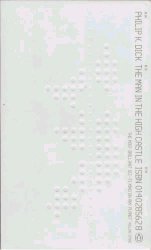
The Man in the High Castle
Philip K. Dick
249 pages
published in 1962
I first read The Man in the High Castle when I was fourteen or fifxteen. Which is about the perfect age to read Philip K. Dick, as he is so nicely subversive; you need authors like that at fifteen. And indeed I read quite a lot of Dick then. Back then, Dick was still somewhat obscure, but in the last decade or so he has been discovered by the literary establishment, or at least the hipper parts of it. Unfortunately this only happened after his death, so he didn't benefit from it personally.
The edition I read this in is a product of that discovery, as it is a Penguin Classic. It comes complete with a slightly fawning introduction by one Eric Brown, supposedly a science fiction novelist himself, though this is the first I have heard of him. As usual with people championing a science fiction writer to a mainstream audience, Brown feels the need to distance Philip K. Dick from science fiction as a whole. He emphasises that one won't find the usual sf gadgets here: "no air-cars or rocket-ships, no talking gadgets or telepaths". Which annoys me, because while it does convey that Dick is a serious writer worthy of one's attention, it does so by invoking mainstream prejudices against science fiction, as if writing a serious novel with air-cars, rocket-ships, talking gadgets or telepaths is impossible. Beside which, he is wrong, since The Man in the High Castle does feature rocketships, if only in the background...
However, I do think he is right to point out that this is a very accessible novel for those who have no interest in science fiction or have not read any science fiction. The central conceit of the story, "what would the world be like if the Axis won World War II", is one most people will have been curious about at some point. And if one can swallow this conceit, one will have no great difficulties in reading the book. The other advantage this novel has for people coming from a more literary background is that the writing in it is both clear and accessible, as well as elegant. The various characters all can be distinguished by the variations in their speech patterns and interior dialogue.
The book is set in contemporary America (roughly 1962) and describes a world in which Germany and Japan won World War II and as a consequence of which the United States is divided in three: the East Coast and the old South are a client state of Naxi Germany, the Pacific Seaboard is ruled by the Japanese while the Rocky Mountain States are neutral and form a bufferzone between the Japanese and German spheres of interest. Japan and Germany are now locked in a cold war, with Japan clearly being the more sane. In the background is not only the constant threat of nuclear war, but are also the many horrors the Nazis have inflicted on the countries they now rule, including the genocide of Africa. I noticed this constant feeling anxiety only during this reread, completely missing it when I originally read it.
The story of The Man in the High Castle revolves around two books. The first is The Grasshopper Lies Heavy, a novel within the novel written by one Hawthorn Abendsen. This book is in fact a science fiction novel showing a world in which the Axis did not win the war, though it is not our own world. Naturally this book is not only banned in Boston, but through the entire German controlled USA and Europe; possession punishable by gaschamber. Which is why Hawthorn, according to the novel's backcover lives in a castle somewhere in the Rocky Mountains States and is heavily armed; he is in fact the man in the high castle. Several extracts from The Grasshopper Lies Heavy show not only how Hawthorn imagined the Axis lost the war, but also how they in fact won the war in the reality Dick shows us.
The other important book in The Man in the High Castle is the I Ching, the ancient Chinese book of divination. The main characters in the novel use the I Ching to help them make important discussions. It is through the use of the I Ching that the reality of the world in The Man in the High Castle is questioned.
The Man in the High Castle starts off slowly, its characters going about their normal lives, only to have them overturned when political developments in Germany coming to a head. Though there are elements of a 'save the world' plot here, in the end this is not followed through. Which is for the best, I think. The way in which we are shown the world of The Man in the High Castle, through hints and small asides works much better then if this would've been a traditional sf adventure story. It is much more chilling and effective this way.